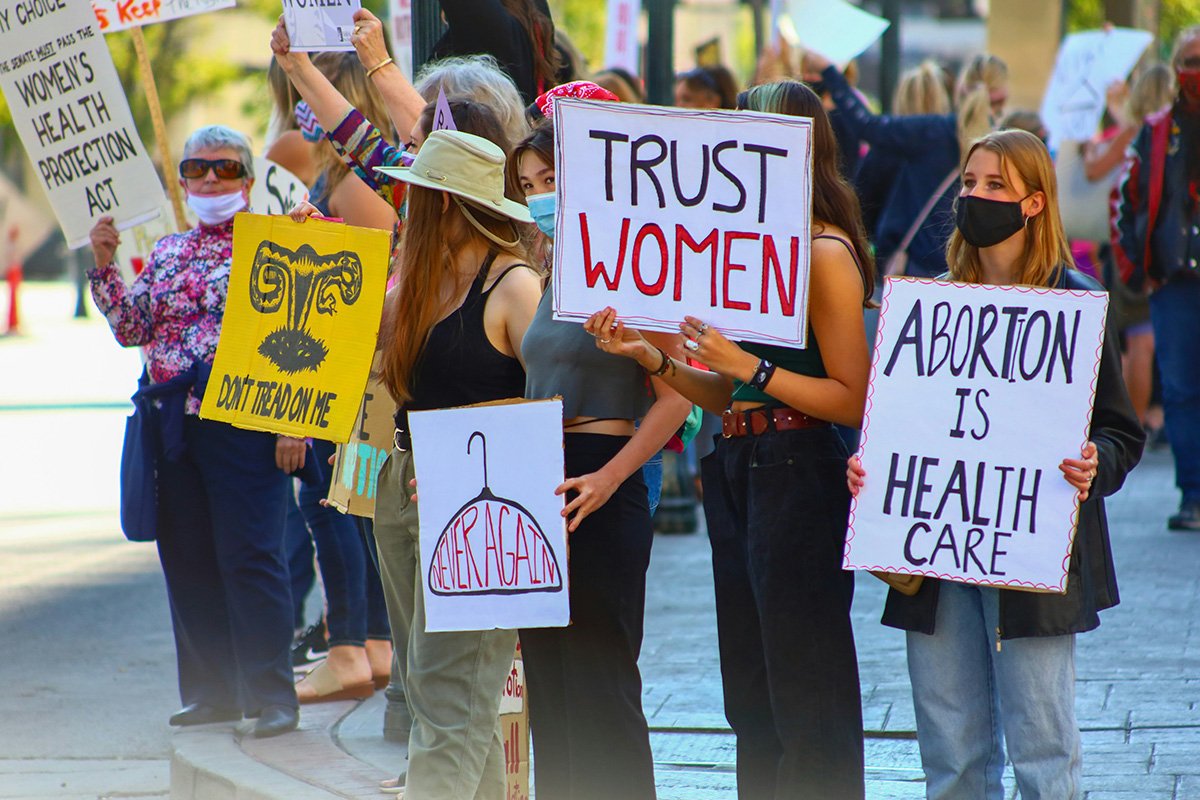
January 22, 2018; Mother Jones and the New York Times
The 7-to-2 Supreme Court decision in Roe v. Wade on January 22, 1973 legalized abortion in all 50 states. Today, though abortion remains legal, it’s not easily accessed or available to the majority of the country’s population. In the last few years, new laws have placed extra restrictions on clinics and hospitals that provide abortions. The burden of these regulations has forced the closure of many clinics, causing clients to travel great distances and endure long waits for a procedure that’s typically without much risk. This chipping away at the accessibility of reproductive services takes its greatest toll on the poorest clients, those who can least afford the costs of waiting periods, long-distance travel, or additional children.
The argument coming from the conservative side is that of saving lives. Their belief that life begins at conception is so strong that they will do whatever they can to advance an anti-choice agenda. And they have found their champion in President Trump, who had as part of his campaign platform the promise to only nominate judges who opposed abortion to the federal courts.
In March 2016, Trump infamously said that women deserve “some form of punishment” for abortion. He later clarified, saying he meant doctors, not women, should be “held legally responsible.” In October of the same year, Trump vowed, if elected, to appoint judges who’d overturn the Roe v. Wade decision.
And, in turning to two of the most conservative think tanks in the country, the Federalist Society and the Heritage Foundation, for lists of judicial candidates, President Trump is fulfilling his promise. The Senate Judiciary Committee and the full Senate are confirming these appointments at a record pace.
The other path toward the effective undoing of Roe v. Wade is already underway: working with states and state legislatures to make abortion so difficult that it almost disappears. As Jackie Flynn Mogenson writes in Mother Jones:
Sign up for our free newsletters
Subscribe to NPQ's newsletters to have our top stories delivered directly to your inbox.
By signing up, you agree to our privacy policy and terms of use, and to receive messages from NPQ and our partners.
Despite the recent confirmation of conservative judge Neil Gorsuch (whose legal views have proven unfavorable to reproductive rights), legal experts say the chance of the Supreme Court overturning Roe v. Wade is still slim. It’s much more likely the court rules in favor of states’ authority to place excessive requirements on getting an abortion—like mandating that women have funerals for their aborted fetuses or receive approval from men first.
Restrictions like these, experts argue, could so severely limit access to abortion, it’d be as if Roe v. Wade never happened at all. “Some states have protected abortion access, while others have made it very difficult to access services,” Heather Boonstra, the director of public policy at the Guttmacher Institute, tells Mother Jones via email. Ironically, she says, this creates conditions “similar to the picture of abortion access pre-Roe,” when low-income women, like McCorvey, didn’t have the means to travel to other states to receive a safe abortion.
An aspect of the Roe v. Wade decision that often gets lost in the arguments about when life begins, fetal viability, and religious belief is that the decision was largely based on the issue of privacy. In an op-ed in the New York Times, Mary Ziegler, a law professor at Florida State University, raises the question contained in the Roe v. Wade decision of just what the right to privacy means and who can claim it: “Because we so often identify Roe with a woman’s right to choose, we forget that the original decision attracted the ire of feminists who believed that the court had focused too little on women’s interests in fertility control. The court held that the right to privacy was broad enough to encompass a woman’s decision, with her doctor, to terminate her pregnancy.”
The issue of privacy in Roe connected it to new ideas about individual identities and choices. This allowed Roe to serve as a base for who might have autonomy and why they might have it. Privacy in making decisions on both the conservative and liberal sides of the aisle—on LGBT rights, on rights for sex workers, on seeking unproven medical treatments, and more—all found grounds in this decision. Roe became the foundation for much of what we now see as individual rights and often take for granted. Barry Goldwater even used the decision to support demands for privacy protections for personal information.
Today, the battle to protect privacy in the digital age looms large. What was set out in Roe v. Wade may not hold up in the age of Google and Microsoft. But, as Zeigler writes, “Part of Roe’s legacy is the many ways conservatives and liberals once reimagined the right to privacy. Social movements hardly felt constrained by what the Supreme Court had written.”
The battle that swirls around Roe v. Wade is not just about abortion. It was decided around the right to privacy—particularly a woman’s right to privacy. So, as related issues of women’s rights to contraception, abortion, and equality in society play out in the courts and in state and federal legislatures, the groundwork laid in 1973 will serve as the starting point. If overturned, as some expect it might be, Roe v. Wade could tip the balance of privacy rights for many others who have built their cases on its base. For those who see this case as only as a question of fetal life or death, there is no issue of privacy. But, in a nation that takes great pride in its diversity and equity and privacy, this poses a hard question: Are we prepared to give up our right to make private, personal decisions and defer to a singular perspective? And what rights will we give up next?—Carole Levine












